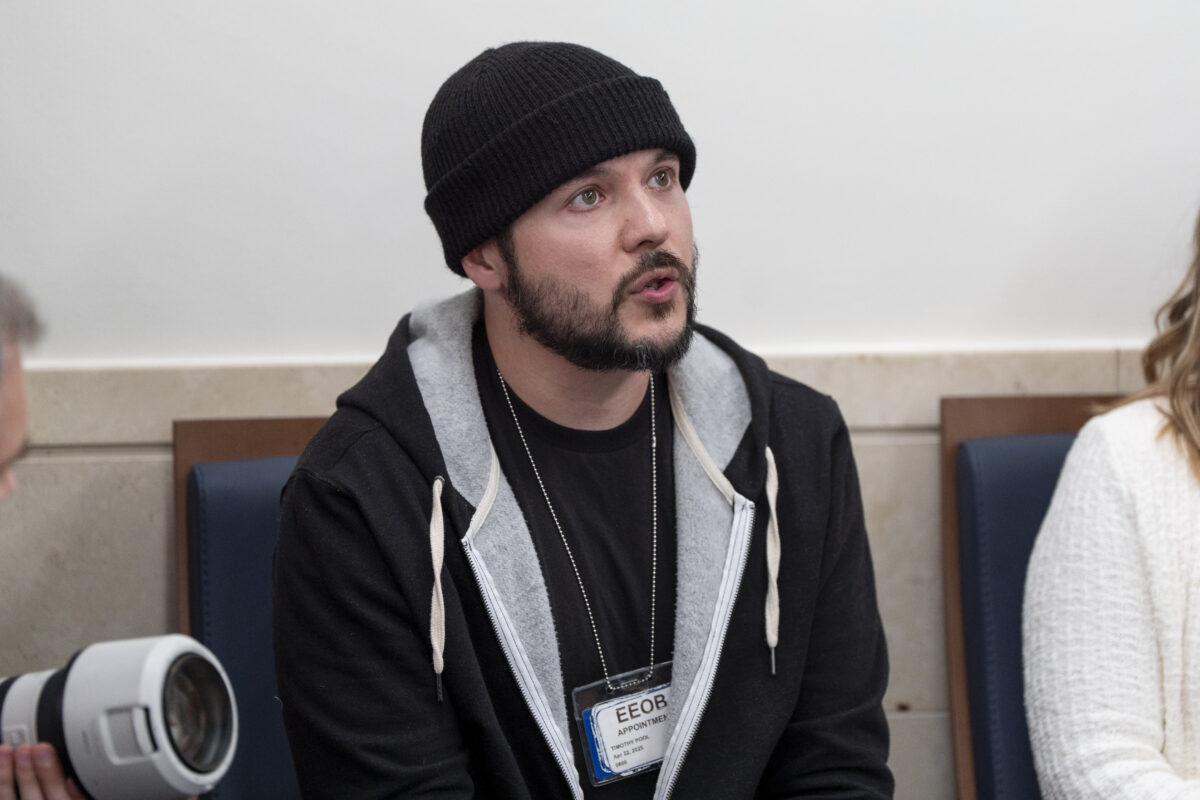Turns Out Podcasters Make for Poor White House Reporters

AP Photo/Alex Brandon.
For years, independent media has assailed the traditional press for a variety of alleged sins — a deference to experts, a censorious approach to fringe ideas, and perhaps most consistently, gentle handling if not outright support for Democrats.
As pro-Trump podcaster Tim Pool put it in 2020, on the eve of Joe Biden’s inauguration: “Journalism now exists to protect the corrupt.”
Half a decade on, with President Donald Trump back in office, those independent voices are finding mainstream legitimacy on a larger scale than ever. Ground zero for this new world is the White House briefing room, where press secretary Karoline Leavitt has established a “new media” seat that kicks off each briefing with the first question. The seat has featured some traditional reporters, like Mike Allen of Axios, but has mostly been occupied by pro-Trump internet personalities.
What have these figures, when given the remarkable opportunity to ask the most powerful government on the planet questions, and after years of bashing the traditional media for complicity with the U.S. government, done with this power?
Take Tim Pool, our aforementioned truth-teller who occupied the seat last Tuesday. Here’s what he asked Leavitt:
Many of the news organizations that are represented in this room have marked in lockstep on false narratives such as the ‘Very Fine People’ hoax, the Covington smear, and now what’s being called the Maryland Man hoax, where an MS-13 gang member adjudicated by two different judges, I believe, is just simply being referred to as ‘a Maryland Man’ over and over again. I’m wondering if you can comment on the unprofessional behavior.
Putting aside whether you agree with his assertions, the tragedy of Tim Pool’s question for the White House lies in its utter uselessness. No one is served by the press secretary being asked to reflect upon how terrible the media is.
It’s worthwhile to remember that the point of opening up the White House to the press — whether it’s a Democratic or Republican administration — is accountability. Since Franklin Roosevelt, a press pool has covered American presidents. They’ve confronted administrations on scandal, on impeachments, on war. Their job is to glean information from the most powerful office on the planet; to hold the renters of 1600 Pennsylvania Avenue accountable during the term of their lease.
Which is why displays like the one put on by Pool are such a maddening waste of time. And it’s not just him; the press briefings during this new era of democratized media have been stocked with fawning questions more befitting a Ba’ath party conference than the press room of the world’s most powerful democracy.
There was the staffer from MyPillow CEO Mike Lindell’s outlet who asked for Trump’s fitness plan, reasoning that he looked “healthier than ever before.” There is the obsequious omnipresence of Brian Glenn, the Real America’s Voice host and boyfriend of Marjorie Taylor Greene, who prefaced his inaugural question in the briefing room by telling Leavitt, “You look great — you’re doing a great job!”
Unlike a Ba’ath party conference, these personalities do not need to convince Saddam Hussein to spare their lives. These public displays of fealty are entirely voluntary and un-coerced, which makes the rising epidemic of bootlickery that much more pathetic.
The independent media’s turn towards sycophancy extends beyond the White House. Joe Rogan, perhaps the most famous independent media voice in the world, earned his audience thanks in no small part to his ideological heterodoxy and unvarnished criticism of the establishment. But by 2025, he has morphed into the most prominent booster of the elites. His fawning interviews with Elon Musk, Peter Thiel, Marc Andreessen, and Mark Zuckerberg stretch for dozens of hours. The confabs are exceedingly promotional, with nary a tough question or an ounce of skepticism.
Therein lies the trouble with ceding the media ecosystem to independent voices. They rose in prominence on the premise that the traditional press had succumbed to corporate interests, that they would not tell you the truth because the powerful would not let them. The reality is that the accountability structures in place at traditional news outlets ensure that they are a far better source of information than the independent media, which is more susceptible to a more potent pressure: audience capture.
On the internet — where even the stars have to busk for their pay — the incentive to tell your audience something they don’t want to hear is non-existent.
New media deserved this shot that they’ve gotten. In the wake of Trump’s remarkable victory, these figures now speak for an agenda supported by a plurality of the country, and in many cases, their audiences are enormous. And those audiences deserve representation.
But when they ask fawning questions, they are no longer representing those audiences, they are representatives of Trump. Tim Pool’s listeners, no doubt, want Trump to succeed. But it’s because, in many cases, they are passionate about the things he promised.
True believers like Steve Bannon are already asking tough questions of this administration. Pro-Trump economic analysts like Fox’s Charles Payne are too. In many cases, they’re asking questions that the old guard wouldn’t necessarily ask.
The pro-Trump media can serve their audiences by asking those questions. Or they can forsake their larger audience to instead serve an audience of one.
This is an opinion piece. The views expressed in this article are those of just the author.





Comments
↓ Scroll down for comments ↓